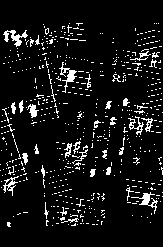 WE've MOVED
WE've MOVED
see new address and contact email in ABOUT US
"Double Jeu Trio featuring Michel Godard"
Francois Chevrolet: Alto Saxophone
Michel Godard: Tuba
Christian Graf: Guitar
Bernard Trontin: Percussion, samples
The idea of musical fusions has always seemed to have appeal to the composition-minded. There is something intellectually appealing about the experiment of welding different kinds of music into various sonic Rube Goldberg devices. However, it is less clear whether all of the musical greats, to whom the F-word is applied, actually set out consciously toward this composer’s goal. King Crimson, Captain Beefheart, Bill Frisell come to mind as creators of some timeless "fusions" (if we must) that somehow lack the self-consciousness of others in the same CD bin.
Although this CD is more rewarding than many other hybrids, I must report that it has a sizable helping of that self-consciousness that pervades fusion. The back story, according to liner notes, seems to be of a group of active individual Continental musicians who variously work in jazz, free jazz, classical avant-garde, rock, and so on. They bring these disparate influences to bear on the compositions of Francois Chevrolet, and the DJT is born.
Don’t celebrate yet. The self-consciousness is mainly in the fact that the compositions are overly modular. They do not move through the different sections very smoothly, perhaps because the transitions tend to be quite awkward--now we do the funkier staccato stuff, now the more open "free" stuff, now the mysterioso atonal heads, and so on. While this approach makes for a listening experience on the seat’s edge, what it does not do is reward repeated listenings. By the middle of the second listen to the disc, my mind completely wandered, and I found some of the patchwork quality annoying.
The compositions themselves are most analogous to much of the early- to mid-eighties music from New York’s Downtown scene. The tuba and the lilting minor and atonal lines make a comparison to Bobby Previte’s work tough to avoid. The more energetic stuff, and and the inclusion of a guitar share qualities with Wayne Horvitz’ President, although Graf tends to sound more like Joe Baiza of Universal Congress Of than Bill Frisell.
One problem of most of the compositions is that the main themes are often played by the guitar and alto in unison. Chevrolet has a dark, restrained approach as it is--closer to Paul Desmond than John Zorn--and so most of the lines have this thin, pinched quality that weakens them. This seems to add to the sense of hesitancy and self-consciousness.
I do not want to leave the impression that this CD is worse than it is.
The musicians here are all very competent, and as I implied above, the first listening of
the disc kept me wondering whether something great was just a few bars away. As is often
the case with fusion, this stuff might have been geared to expanding the gigging
possibilities of the musician. It would be offensive neither in rock clubs nor jazz clubs,
and make for a decent evening out in either venue. Trouble is, that’s just not good
enough to guarantee that the audience members will ever want to see them again.
-Wyman Brantley
contact: Francois Chevrolet
16, 16, av. Jules Crosnier
CH-1206 Geneve
www.fusions.ch/doublejeu